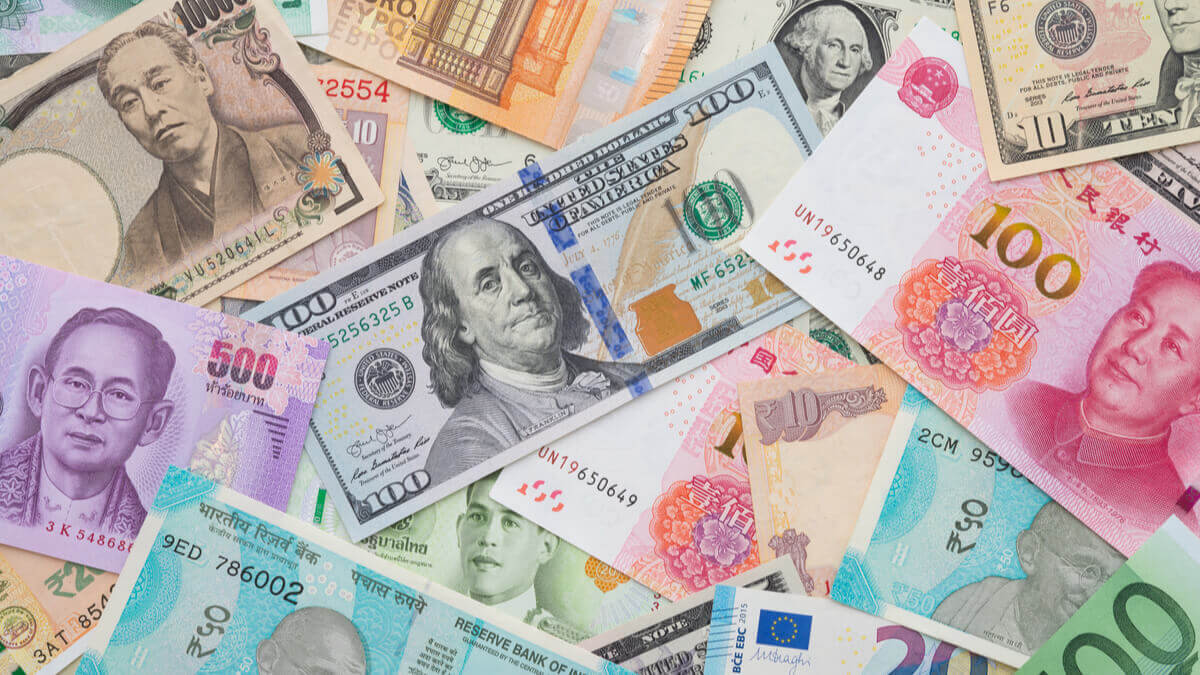Does Venmo charge international fees?
Here’s what you need to know about Venmo’s international and foreign transaction fees.

When people in the finance world talk about hard currencies, they’re referring to money issued by governments viewed as both politically and economically stable.
Businesses around the world accept hard currencies as payment for goods and services. And in some countries, they actually prefer a hard currency over the local currency.
If you need to use a lot of currencies too, look at Wise. With a free Wise account, you can hold over fifty currencies and send them 6x cheaper than with traditional banks.
As of this writing, the top five currencies in the world according to World Bank data are the US dollar (USD), European euro (EUR), Japanese yen (JPY), British pound (GBP), and the Australian dollar (AUD).¹ The Swiss franc (CHF) also appears on many top lists.
These currencies have investor and business confidence around the world because they aren’t typically susceptible to large fluctuations in valuation.
Of these currencies, the US dollar is the most noteworthy as it has a special status as the world’s top foreign reserve currency.²
Many international transactions between businesses and governments use US dollars. And when developing countries experience a softening of their own currency, they exchange and horde US dollars to hold on to their wealth.
When a currency is hard — also known as strong — there are both benefits and detriments to various groups of people around the world.
Hard currencies have a higher value over other currencies in the foreign exchange market — also known as forex or just FX. And if you hold a strong currency, then you can buy more of a foreign currency with lesser value.
With that in mind, let’s examine both sides.
Cheap travel
Because hard currencies have more value, they have more buying power in countries with soft currencies. How often do you hear about Westerners going to places like Thailand, Indonesia, Vietnam, and the Philippines and living like royalty during their vacation? — or even living there for months at a time!
Cheaper imports
Countries with hard currencies often import goods from soft currency countries. If — usually ‘when’ — the manufacturer’s currency depreciates, the items become cheaper. This often happens in the US with goods imported from China, leaving Americans with more disposable income.
Foreign international businesses benefit
When foreign businesses do business in a hard currency country, their investors and business benefit when the currency is strong. If you sell a lot of items in a hard currency country and bring the money back to your home country, you’ll gain more on the exchange rate.
Higher-priced domestic travel
If international travel is cheaper, then domestic travel is typically more expensive — unless a government subsidizes their travel industry.
Exporting is more expensive
The same goes for importing vs exporting. When you export from a hard currency country to a soft currency country, the hard currency country makes less money. This compounds as the hard currency grows in value.
Negative impact on developing economies
When foreign governments use hard currencies for their reserves, they pay more to get them. It can be difficult for developing economies to get large amounts of reserves when hard currency values appreciate.
The two elements expected from every hard currency are stability and liquidity. People expect the currency to remain relatively stable for the short and long term. And hard currencies are easily exchangeable on the forex market.
But there are several factors that affect the stability and liquidity of a currency, including:
You’ll find soft currencies in countries that are still developing and in countries with an unstable political environment.
The currency fluctuates in value and depreciates against other hard currencies, as soft currency countries have economies that haven’t diversified enough to offset negative economic impacts.
This causes their currency to have a high level of volatility on the forex market. Any political, economic, or environmental activity can cause a dramatic shift in the currency’s value.
Every country has economic highs and lows. But countries with soft currencies have harsher and long-term effects from severe impacts. In other words, they can’t weather the storm.
When negative events happen, investors take their money and run back to hard currency countries.
There’s no definitive answer here. It’s relative based on who you ask. However, gold has been used as a currency for thousands of years and holds a relatively stable value. And it was used as a standard for most currencies until 1971.³
This is another question with no definitive answer and a lot of relativity based on your location and economic situation. Two factors that can affect this are tradeability and safety. For this reason, we’ll again refer to the World Bank data listing the current top five currencies.¹
| 💡 Wise (formerly TransferWise) is the cheapest, easiest way to send, receive, hold, and convert money around the world — up to 6x cheaper than a bank. |
|---|
All sources checked on 30 May 2022
*Please see terms of use and product availability for your region or visit Wise fees and pricing for the most up to date pricing and fee information.
This publication is provided for general information purposes and does not constitute legal, tax or other professional advice from Wise Payments Limited or its subsidiaries and its affiliates, and it is not intended as a substitute for obtaining advice from a financial advisor or any other professional.
We make no representations, warranties or guarantees, whether expressed or implied, that the content in the publication is accurate, complete or up to date.

Here’s what you need to know about Venmo’s international and foreign transaction fees.

Here’s what you need to know about Western Union’s international transfer fees.

Can you send money from Venmo to Wise? Find out in this guide.

Read on for everything you need to know about sending and receiving international wire transfers with PNC.

Read on for everything you need to know about sending and receiving international wire transfers with First Horizon.

Read on for everything you need to know about sending and receiving international wire transfers with First Republic.